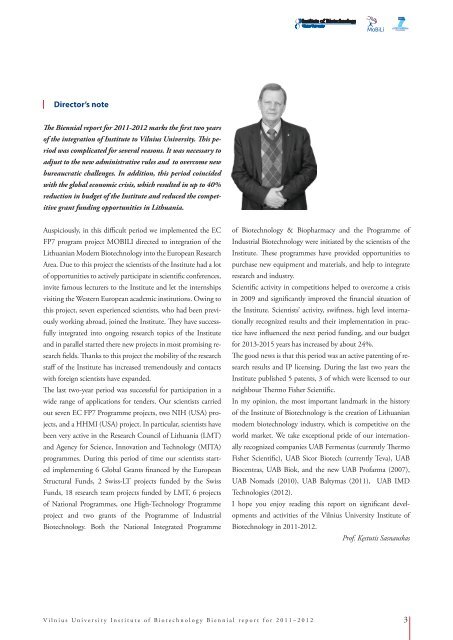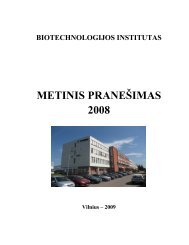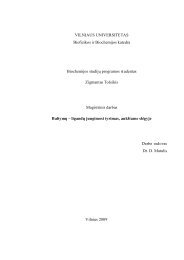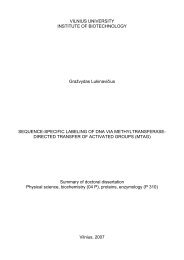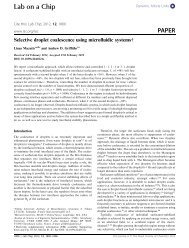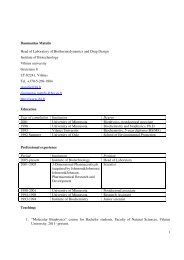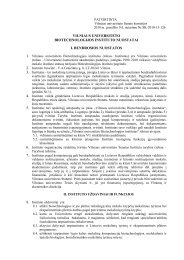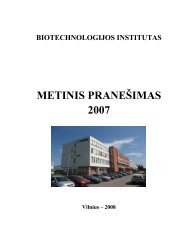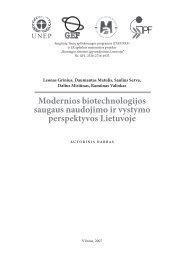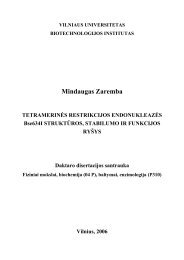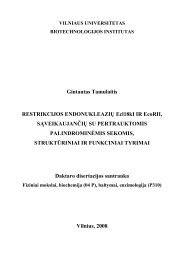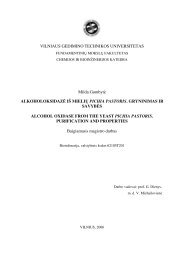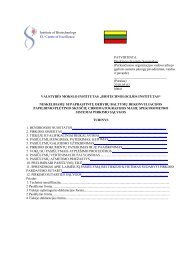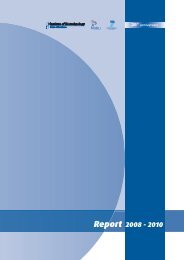Biennial Report 2011â2012
Biennial Report 2011â2012
Biennial Report 2011â2012
You also want an ePaper? Increase the reach of your titles
YUMPU automatically turns print PDFs into web optimized ePapers that Google loves.
Director’s note<br />
The <strong>Biennial</strong> report for 2011-2012 marks the first two years<br />
of the integration of Institute to Vilnius University. This period<br />
was complicated for several reasons. It was necessary to<br />
adjust to the new administrative rules and to overcome new<br />
bureaucratic challenges. In addition, this period coincided<br />
with the global economic crisis, which resulted in up to 40%<br />
reduction in budget of the Institute and reduced the competitive<br />
grant funding opportunities in Lithuania.<br />
Auspiciously, in this difficult period we implemented the EC<br />
FP7 program project MOBILI directed to integration of the<br />
Lithuanian Modern Biotechnology into the European Research<br />
Area. Due to this project the scientists of the Institute had a lot<br />
of opportunities to actively participate in scientific conferences,<br />
invite famous lecturers to the Institute and let the internships<br />
visiting the Western European academic institutions. Owing to<br />
this project, seven experienced scientists, who had been previously<br />
working abroad, joined the Institute. They have successfully<br />
integrated into ongoing research topics of the Institute<br />
and in parallel started there new projects in most promising research<br />
fields. Thanks to this project the mobility of the research<br />
staff of the Institute has increased tremendously and contacts<br />
with foreign scientists have expanded.<br />
The last two-year period was successful for participation in a<br />
wide range of applications for tenders. Our scientists carried<br />
out seven EC FP7 Programme projects, two NIH (USA) projects,<br />
and a HHMI (USA) project. In particular, scientists have<br />
been very active in the Research Council of Lithuania (LMT)<br />
and Agency for Science, Innovation and Technology (MITA)<br />
programmes. During this period of time our scientists started<br />
implementing 6 Global Grants financed by the European<br />
Structural Funds, 2 Swiss-LT projects funded by the Swiss<br />
Funds, 18 research team projects funded by LMT, 6 projects<br />
of National Programmes, one High-Technology Programme<br />
project and two grants of the Programme of Industrial<br />
Biotechnology. Both the National Integrated Programme<br />
of Biotechnology & Biopharmacy and the Programme of<br />
Industrial Biotechnology were initiated by the scientists of the<br />
Institute. These programmes have provided opportunities to<br />
purchase new equipment and materials, and help to integrate<br />
research and industry.<br />
Scientific activity in competitions helped to overcome a crisis<br />
in 2009 and significantly improved the financial situation of<br />
the Institute. Scientists’ activity, swiftness, high level internationally<br />
recognized results and their implementation in practice<br />
have influenced the next period funding, and our budget<br />
for 2013-2015 years has increased by about 24%.<br />
The good news is that this period was an active patenting of research<br />
results and IP licensing. During the last two years the<br />
Institute published 5 patents, 3 of which were licensed to our<br />
neighbour Thermo Fisher Scientific.<br />
In my opinion, the most important landmark in the history<br />
of the Institute of Biotechnology is the creation of Lithuanian<br />
modern biotechnology industry, which is competitive on the<br />
world market. We take exceptional pride of our internationally<br />
recognized companies UAB Fermentas (currently Thermo<br />
Fisher Scientific), UAB Sicor Biotech (currently Teva), UAB<br />
Biocentras, UAB Biok, and the new UAB Profarma (2007),<br />
UAB Nomads (2010), UAB Baltymas (2011), UAB IMD<br />
Technologies (2012).<br />
I hope you enjoy reading this report on significant developments<br />
and activities of the Vilnius University Institute of<br />
Biotechnology in 2011-2012.<br />
Prof. Kęstutis Sasnauskas<br />
Vilnius University Institute of Biotechnology <strong>Biennial</strong> report for 2011–2012 3


